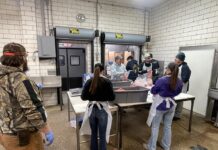“Out of the long list of nature’s gifts to man, none is perhaps so utterly essential to human life as soil.”
— Hugh Hammond Bennett
Nearly everyone who works in the conservation field knows about Hugh Hammond Bennett.
Bennett graduated from the University of North Carolina in 1903, with a degree in chemistry and geology, and started work with the U.S. Department of Agriculture shortly thereafter to help complete county-based soil surveys — a program that had only just begun.
But in the decades to come, he studied soils all over the country and came to realize that American farmers were destroying the very same soils that they were relying on to feed their families.
He was certainly a leader in soils research, and by the 1930s was named to be the first director of the Soil Erosion Service. He convinced a lot of folks in Washington of the need to protect our soils and is generally considered to be the “Father of the Conservation Movement” that still continues.
As the Noble Soil and Water Conservation District prepares to celebrate our 75th birthday, we have scoured our office to find old pictures and documents to display at our functions.
One of the biggest surprises that we found was a congratulatory letter to the board of supervisors from Mr. Bennett himself.
It came in response to the 1943 annual report that was submitted by our original board after their first full year of existence. This narrative report outlines the things that the district had accomplished in such a short time and set goals for things to come.
Report from 1943
They reported that the attitude of the farmers was good, but some supporters “were reluctant to actively participate due to lack of farm labor. (This county has lost more of its manpower to the Army and industry than any other county in the state.)”
They reported on improvements to the soil and lessons learned from visiting the “Experimental Farm” near Zanesville. A forestry specialist was requested to advise landowners on woodland management and the production of timber for the war effort.
And they mentioned that 750 pounds of milkweed pods had been collected by school children. Back then, the “floss” was used in life preservers and in garments for insulation against cold. “Four and a half ounces in an eight and a half ounce jacket provides enough warmth for flying in the stratosphere.”
Going strong
So, here we are, 75 years later, and conservation movement is still going strong.
We’ve gone from digging by hand and placing clay tiles for drainage, to using ditchers that are guided by laser beams. We’ve moved from real horsepower to unreal horsepower as equipment continues to get bigger every year — and satellites above guide it toward the straightest rows you can imagine — even straighter than check-wires.
In those first years, as folks were learning of the value of adding lime to fields, there was a shortage of lime as the same lack of manpower affected the production and hauling of lime to the local farms. Today we have the 4R program to help guide us on how to apply nutrients, but we also have equipment to grid-sample the soil in huge fields, load that information into a computer, and use equipment that will vary the rates of fertilizer applied as we plant that field.
Near as I can tell, testing the soil nutrient levels in fields hadn’t even been invented in the 1940s.
We’ve certainly come a long way, and in the process, crop yields have increased 400 or 500 percent or more as we feed the world.
Soil erosion will never be stopped, but we sure have a better handle on it than before.
Today we worry more about nutrients leaving our fields than sediments, as we have discovered that they cause serious issues, too.
To quote Mr. Bennett’s letter, problems faced in 1943 were “a challenge to our ingenuity. In this world emergency we must, of course, face these problems with courage and our best efforts.”
That spirit is still alive today, as we continue to find ways to feed a growing world population while doing a better job than ever of protecting our most precious resource.












